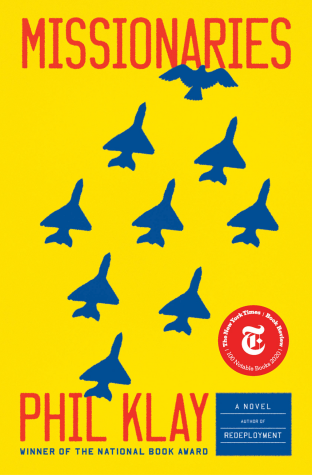
by by Margaret Kolb

Published by Penguin Books, 2021 | 404 pages
“No question, now, what had happened to the face of the pigs. The creatures outside looked from pig to man, and from man to pig, and from pig to man again; but already it was impossible to say which was which.” In the iconic final scene of George Orwell’s Animal Farm, the pigs and the humans become indistinguishable. Capitalist and communist, the most pervasive fundamental ideological division of Orwell’s time, as different as pigs and humans, fuse together through the unifying forces of power and greed.
Phil Klay’s Missionaries seeks the same powerful affect – with a touch of clever homophonic paronomasia – to render missionaries and mercenaries indistinguishable on the contemporary battlefield. Violence, trauma, guilt, hate, and finally the human capacity to hope and survive, distort his characters’ ideals and intentions until they cannot recognize themselves. In the end, they all speak eloquently about peace, and they all bring war.
Missionaries is Klay’s debut novel and second publication following his National Book Award winning compilation of short stories, Redeployment. After that collection’s introspective exploration of the American veteran’s experience during Operation Iraqi Freedom (2003 – 2010), Klay expands his aperture to Colombia’s sixty-year civil war. The result is a dense kaleidoscope of perspectives and experiences that encompass Colombia’s violent past, its delicate reconciliation, and the US’s involvement. Klay combines his penetrating insight into the American veteran’s experience with exhaustive research into Colombia’s generational civil war to create in Missionaries an ambitious novel about a society, a nation, and violence as part of the human condition.
Missionaries ambitious scope also creates its greatest challenge. The novel investigates warfare in the broadest historical and psychological sense, while also recounting a story specific to Colombia, its people, and its unique war. To achieve this, Klay meticulously crafts four diverse narrators with four intersecting story lines. The two Colombian narrators dissect the bewildering complexity of Colombia’s civil war and fragile peace agreement. Meanwhile, the two American narrators superimpose a plenary vision of contemporary warfare through their participation in Colombia’s story. The four narrators’ perspectives refract each other, atomizing analogous experiences through divergent perspectives, and fusing divergent experiences through shared perspectives.
The two American narrators – Lissette, the war correspondent, and Mason, a senior special forces operator – tell the story of the American idealist. Lissette’s character achieves a more dynamic arc as she struggles to reconcile the proselytizing ideal that draws her to reveal war through journalism with the incoherent violence and ubiquitous apathy she sees around her. Disillusioned with the violent inertia of Afghanistan but still dedicated to her ideal, she seeks assignment in “a good war – a war we are winning.” There she finds herself trapped on a battlefield she does not understand, and reliant on the same violent special forces mercenaries that had so disillusioned her in Afghanistan.
Mason’s character also struggles to reconcile an ideal with his lived experience. A senior special forces operator, Mason situates in Colombia but recollects his personal experience of decades of war in Iraq and Afghanistan. Mason sees two competing narratives in the Colombian military officers he operates alongside. One inspires hope as a nation seeks peace and a society seeks forgiveness after decades of war and violence; the other vision twists and transfigures, rebranding factions and rotating voices but perpetuating a cycle of violence that has mutated from normative to endemic. The Colombian mission and US memory conflate to clarify each other; through US eyes Mason sees Colombia’s two futures, and through Colombia’s two futures Mason sees his American past.
The two Colombian narrators provide depth and pace to counterbalance the geographically disparate and atemporal experience of the Americans. Abel – an advisor to a paramilitary leader – serves as a Colombian Everyman. His family brutally murdered when he was a child, after which he enlisted in a local paramilitary group, Abel gives voice to a generation trapped by necropolitics. When a local commander asks the adolescent Abel if he fights to avenge his family’s murder, Abel inwardly comments that he did not know one needed a reason to fight. In Abel’s Colombia, children learn that they either join a cause and die fighting, or remain passive until they are killed for sport or as a political prop to reinforce fear.
Juan Pablo, a Colombian military officer, contrasts Abel’s rural victimized voice with that of the Colombian intelligentsia. The reader meets Juan Pablo at a crucible moment in his life. After twenty years of fighting – and arguably winning – Colombia’s gruesome civil war, he rationalizes the violence he has committed and contemplates his own future. His teenage daughter challenges his worldview. She is skeptical of the educated military class that fought the war and immerses herself in a liberal academic tradition focused on reconciliation and social and economic equality.
Father and daughter share a chilling exchange at the novel’s conclusion. The daughter, Sara, has embarked on a reconciliation mission to Colombia’s war-torn interior and participated in a media action that results in the targeted killing of a notoriously brutal Colombian warlord. Sara learns in that moment what Abel knew all along: killing a warlord begets retribution and the killing of innocents. The military refers to this as “collateral damage.” This new warlord retaliates by killing the aid worker that had helped Sara on her mission. As Sara spirals mentally and emotionally to process what she has done, Juan Pablo finds out and responds, “I’m proud of you – you were in a war.” The activist daughter becomes an assassin, and the Soldier father hears confession like a priest. Meanwhile in the narco-town, the new aid worker has “seen cycles like this before.”
While the meticulously situated narrators drive the plot, Klay’s authorial voice pervades the novel. The narrators experience and grow but never achieve epiphany. Instead, they pilot the reader through tributaries stocked with aphorisms and figurations like four distinct Virgils guiding Dante through hell and didactically explaining the torments. Supernatural forces guide the characters, and it is the reader that seeks enlightenment.
If there is any risk to Missionaries’ panoramic approach to war and the human condition, it is the threat of reducing Colombia’s fantastical history to the banality of its civil war. In fact, Missionaries often leaves the reader hungry for more. It is here that Klay’s voice emerges from the narrators, offering those apothegms and figurations to cover more ground than a linear plot is able. It is an incredibly ambitious call for a debut novel, and one that Missionaries answers resoundingly.
Adam Karr graduated from the United States Military Academy at West Point in 2005 with a B.S. in International History, and earned a Master of Arts in English from the University of Virginia in 2014. He is currently an operations officer in the Defense Logistics Agency.















click to see who
MAKE Magazine Publisher MAKE Literary Productions Managing Editor Chamandeep Bains Assistant Managing Editor and Web Editor Kenneth Guay Fiction Editor Kamilah Foreman Nonfiction Editor Jessica Anne Poetry Editor Joel Craig Intercambio Poetry Editor Daniel Borzutzky Intercambio Prose Editor Brenda Lozano Latin American Art Portfolio Editor Alejandro Almanza Pereda Reviews Editor Mark Molloy Portfolio Art Editor Sarah Kramer Creative Director Joshua Hauth, Hauthwares Webmaster Johnathan Crawford Proofreader/Copy Editor Sarah Kramer Associate Fiction Editors LC Fiore, Jim Kourlas, Kerstin Schaars Contributing Editors Kyle Beachy, Steffi Drewes, Katie Geha, Kathleen Rooney Social Media Coordinator Jennifer De Poorter
MAKE Literary Productions, NFP Co-directors, Sarah Dodson and Joel Craig